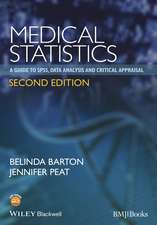Handbook of Systems and Complexity in Health
Editat de Joachim P. Sturmberg, Carmel Martinen Limba Engleză Paperback – 28 oct 2014
| Toate formatele și edițiile | Preț | Express |
|---|---|---|
| Paperback (1) | 1333.61 lei 43-57 zile | |
| Springer – 28 oct 2014 | 1333.61 lei 43-57 zile | |
| Hardback (1) | 3607.52 lei 22-36 zile | |
| Springer – 7 ian 2013 | 3607.52 lei 22-36 zile |
Preț: 1333.61 lei
Preț vechi: 1403.80 lei
-5% Nou
Puncte Express: 2000
Preț estimativ în valută:
255.27€ • 277.37$ • 214.56£
255.27€ • 277.37$ • 214.56£
Carte tipărită la comandă
Livrare economică 21 aprilie-05 mai
Preluare comenzi: 021 569.72.76
Specificații
ISBN-13: 9781493922550
ISBN-10: 1493922556
Pagini: 976
Ilustrații: XXI, 954 p. 268 illus., 165 illus. in color.
Dimensiuni: 178 x 254 x 58 mm
Greutate: 1.66 kg
Ediția:2013
Editura: Springer
Colecția Springer
Locul publicării:New York, NY, United States
ISBN-10: 1493922556
Pagini: 976
Ilustrații: XXI, 954 p. 268 illus., 165 illus. in color.
Dimensiuni: 178 x 254 x 58 mm
Greutate: 1.66 kg
Ediția:2013
Editura: Springer
Colecția Springer
Locul publicării:New York, NY, United States
Public țintă
Professional/practitionerCuprins
1. Complexity in Health - An Introduction.- 2. Complexity, uncertainty and mess as the links between science and the humanities in healthcare.- Part 1 - Complexity Theory and Methods.- 3. Understanding Complex Systems.- 4. The Complex Nature of Knowledge.- 5. Mathematical Principles: Tales of Tails.- 6. Modelling.- 7. A methodology for the analysis of medical data.- 8. Psychological Rhythmicities.- 9. Modeling Illness and Recovery with Nonlinear Dynamics.- Part 2 - Dynamics in Human Health.- 10. Homeostasis: The Dynamic Self-regulatory Process that Maintains Health and Buffers against Disease.- 11. Fractals in Physiology & Medicine.- 12. Bio-complexity: challenging reductionism.- Part 3 - Concepts of Health.- 13. Trying to Make Sense of Health.- 14. Picture Health.- 15. Health - A personal complex-adaptive state.- 16. Understanding Health By Building Better Bio-Medical Models.- 17. Health – a systems and complexity based definition.- Part 4 – Clinical Application.- 18. Complexities of the Consultation.- 19. Inflammation through a Psychoneuroimmunological Lens.- 20. Diabetes control: insights from complexity science.- 21. Complexity and the onset of psychosis.- 22. Understanding intimate partner violence through its dynamics.- 23. Multi-level interdependencies and constraints in panic disorder: Many triggers, few responses.- 24. Nonlinear Relations of Cardiovascular Risk Factors to Neuropsychological Function and Dementia.- 25. Pain and Complex Adaptive System Theory.- 26. Complexity in Movement Disorders: A Systems Approach to Intervention.- 27. Avoidable hospitalizations in older adults.- 28. Continuous Multiorgan Variability Monitoring in Critically Ill Patients – Complexity Science at the Bedside.- Part 5 - Health Services.- 29. An overview of complexity theory: understanding primary care as a complex adaptive system.- 30. Real-time Analytics and Quality of Care.- 31. Medical Sociology and Case-Based Complexity Science: A User’s Guide.- 32. The Drug Prescription Process: a Network Medicine Approach.- 33. Applications of Complex Dynamics, an Approach to Refractory Health Policy Interventions.- 34. Designing for Health Promotion, Social Innovation and Complexity: The CoNEKTR Model for Wicked Problems.- 35. The Dynamical Behaviours of Diseases in Africa.- Part 6 - Health System.- 36. Health Transition Funds Initiatives: Implications for Health System Reform and Evaluation.- 37. Putting complexity to work - supporting practitioners in health systems.- 38. Implementing Adaptive Health Practice — A Complexity-Based Philosophy of Health Care.- 39. Mayo Clinic: Making Complex Healthcare Simpler.- 40. Embracing Uncertainty: Complexity Inspired Innovations at Billings Clinic.- 41. A Complexity Science Perspective of Organizational Behavior in Clinical Microsystems.- 42. Reverse the Epidemic Tides of Unhealthy Habits: Personal, Professional and Leadership Challenges.- 43. Health Professions Education: Complexity, Teaching and Learning.- 44. Understanding Clinical Complexity through conversational learning in medical social networks: Implementing User Driven Health care.- Part 7 – The Future of Healthcare.- 45. Making sense – from complex systems theories, models and analytics to adapting actions and practices in health and health care.- 46. Modeling the Paradox of Primary Care.- 47. Health Care Reform – the need for a complex adaptive systems approach.- 48. A Complexity Science Approach to Healthcare Costs and Quality.- 49. Opportunities in Delivery of Preventive Services in Retail Settings.- 50. Complexity Science in the Future of Behavioral Medicine.- 51. Systems Medicine – A New Model for Healthcare.- Epilogue.
Recenzii
From the book reviews:
“The book has appeal for health professionals including practitioners, educators, researchers, policy makers, and health administrators, as well as graduate students. … It acknowledges a new role for educators -- to shake up ideas and to introduce students to networks, connections, and the contexts in which health occurs -- to instill a passion for lifelong learning. These features set this book apart and make it a welcome addition to the healthcare policy literature.” (Carole Ann Kenner, Doody’s Book Reviews, January, 2015)
“The book has appeal for health professionals including practitioners, educators, researchers, policy makers, and health administrators, as well as graduate students. … It acknowledges a new role for educators -- to shake up ideas and to introduce students to networks, connections, and the contexts in which health occurs -- to instill a passion for lifelong learning. These features set this book apart and make it a welcome addition to the healthcare policy literature.” (Carole Ann Kenner, Doody’s Book Reviews, January, 2015)
Notă biografică
Joachim P Sturmberg MBBS, DORACOG, MFM, PhD, FRACGP I am Adjunct A/Prof of Monash University, Melbourne, and Conjoint A/Prof of General Practice in the Department of General Practice in the Department of General Practice, General Practice, The Newcastle University, Newcastle, Australia. I am a graduate from Lübeck Medical School, Germany, where I also completed my PhD. Since 1989 I work in an urban group practice on the NSW Central Coast, with a particular interest in the ongoing patient-centred care of patients with chronic disease and the elderly. In 1994 I started to pursue systems and complexity research with an inquiry into the effects of continuity of care on the care processes and outcomes. Since then my research has expanded and includes the areas of understanding the complex notion of health, health care and healthcare reform, showing that health is an interconnected multi-dimensional construct encompassing somatic, psychological, social and semiotic or sense-making domains, that health care has to embrace the patient’s understanding of her health as the basis for effective and efficient care, and that an effective and efficient healthcare system ought to put the patient at the centre. I am joint chief editor of the Forum on Systems and Complexity in Medicine and Healthcare in the Journal of Evaluation in Clinical Practice. Together with Carmel Martin and Jim Price I chair the Complexity SIG in WONCA.
Carmel C Martin MBBS, MSc, PhD, MRCGP, FRACGP, FAFPHM I am Visiting Academic Department of Public Health and Primary Care, Trinity College, Dublin, and an Associate Professor of Family Medicine at the Northern Ontario School of Medicine. I am active in clinical general practice with a particular interest in chronic disease and illness and patient centered care and integrated care using information technology, informed by complex adaptive systems theories. I am an Australian medical graduate from the University of Queensland. I completed my Masters in Community Medicine at the London School of Hygiene, University of London and my PhD at the Australian National University. My research in Australia, Canada and Ireland has focused on reforms related to primary health care and chronic care, the nature of health in body, mind, society and the environment and meaning and sensemaking about personal health. My PhD. on the care of chronic illness in general practice, explored the nature of the experience of illness and care associated with multi-morbidity from the perspectives of those afflicted and their general practitioner/primary care physician as the key ‘users’ of care. This PhD led to a wide range of systems based interventions, underpinned by complex adaptive systems theory and social constructionist perspectives in Australia, Canada and Ireland. I am joint chief editor of the Forum on Systems and Complexity in Medicine and Healthcare in the Journal of Evaluation in Clinical Practice.
Textul de pe ultima copertă
Systems and complexity theory plays critical roles in such varied fields as computer science, the physical sciences, meteorology, and economics--and yet health care has yet to take full advantage of what it has to offer. What the theory offers is on rich display as the Handbook of Systems and Complexity in Health presents a revolutionary approach to reforming basic practice and large-scale care delivery, based on the concept of health care as a complex, self-organized, and self-interactive system.
The book's opening section provides readers with a thorough grounding in systems and complexity theory from scientific, historical, epistemological, and technical perspectives, complete with the principles and mathematics behind it. From there, contributors offer models of innovation and improvement in service delivery, disease prevention and health promotion, cost-effectiveness, communication, quality control--in short, a more efficient and equitable future for health care. And one particularly intriguing chapter suggests opportunities for complexity theory in refining the drug prescription process. A sampling of the coverage:
Researchers in health services research, health policy, and health administration will find in the Handbook of Systems and Complexity in Health a new way of viewing health and illness, and potentially a new way to organize health care delivery.
The book's opening section provides readers with a thorough grounding in systems and complexity theory from scientific, historical, epistemological, and technical perspectives, complete with the principles and mathematics behind it. From there, contributors offer models of innovation and improvement in service delivery, disease prevention and health promotion, cost-effectiveness, communication, quality control--in short, a more efficient and equitable future for health care. And one particularly intriguing chapter suggests opportunities for complexity theory in refining the drug prescription process. A sampling of the coverage:
- Understanding health and illness from a complexity perspective.
- A methodology for analyzing medical data.
- Modeling illness and recovery with nonlinear dynamics.
- Clinical applications: inflammation, diabetes, panic disorder, pain, domestic violence, cardiovascular disorders, and the art of the consultation.
- Complexity science at the bedside: continuous multiorgan variability monitoring in critically ill patients.
- Primary care as a complex adaptive system.
Researchers in health services research, health policy, and health administration will find in the Handbook of Systems and Complexity in Health a new way of viewing health and illness, and potentially a new way to organize health care delivery.
Caracteristici
Written by international experts from health services research, primary care, management studies, systems science, and organizational behavior
Applies systems science theory to population health and health care systems, with implications for health policy reform
Applies systems science theory to population health and health care systems, with implications for health policy reform
Descriere
Descriere de la o altă ediție sau format:
This book examines health care as a complex adaptive system, building from introductory passages to health applications of systems science theory, from human physiology to medical decision making, population health and health services research.
This book examines health care as a complex adaptive system, building from introductory passages to health applications of systems science theory, from human physiology to medical decision making, population health and health services research.









